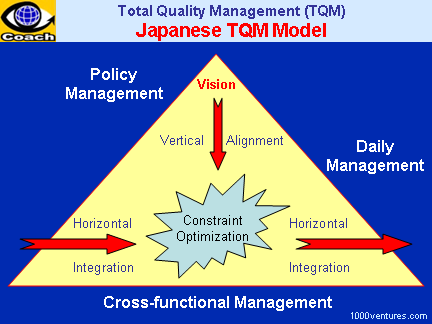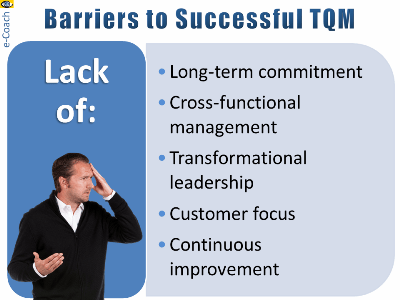| |
Kaizen & TQM
is a movement aimed at
continuous improvement of
managerial performance and
quality at all levels.
Kaizen calls for relentless
efforts for improvement
involving everyone in the
organization.
TQM is a management tool
for improving total performance.
|
|
 |
|
|
|
|
Successful Company
In
Japan, TQC activities are
not limited to quality control
only. Elaborate system of Kaizen
strategies has been developed as
management tools within the TQC
approach. TQC in Kaizen is a
movement aimed at improvement of
managerial performance at all
levels as well as
cross-functionally.
|
|
 |
|
Education and Training
As
a natural follow-up to the
concept of building quality into
people, TQC starts with
education and training of
managers and workers. The major
aim of these awareness and
training programs is to implant
TQC thinking in all employees.
|
|
|
|
|
7
Main Features of the TQC Movement in
Japan |
-
Company-wide TQC, involving all employees, organization,
hardware, and software
-
Emphasis on
education and training
for
→
top management, middle management and workers
-
Quality control
(QC) circle activities by small
groups of volunteers
-
TQC audits
-
Application of statistical methods
-
Constant revision and upgrading of standards
-
Nation-wide TQC promotion
|
|
TQM Requires
Cultural
Transformation
With TQM quality is not the product but the
process. To institute the process, corporate trainers must bring about a
→
cultural transformation wherein all employees shed their individualism
for a unified set of
corporate
values.
TQM was the brainchild
of
Dr. W. Edwards Deming. TQM helped Japan with its postwar economic
recovery. That was because it meshed with
Japanese
→
culture. The Japanese
sense of responsibility to one's superiors and subordinates made it easier
to accept Deming's message that management's role was to provide the optimal
conditions for the workers to do the best job. The Japanese then extended
Deming's teaching to many dimensions of management.
 The Three TQM
Goals at Japan Steel Works The Three TQM
Goals at Japan Steel Works
-
To provide products and
services that
satisfy customer requirements and earn customer trust
-
To steer the corporation
toward higher profitability through such measures as improved work
procedures, fewer defects, lower costs, lower debt service, and more
advantageous order filling
-
To help employees fulfill their potential
for achieving the
→
corporate goal, with particular emphasis on such
areas as policy deployment and voluntary activities
|
|
References:
-
"Productivity Improvement in the Service Sector," Mah Lok Abdullah, APO
Newsletter
-
Kaizen:
The Key To Japan's Competitive Success, Masaaki Imai
-
Gemba
Kaizen: A Commonsense, Low-Cost Approach to Management, Masaaki Imai
|
|
|
|